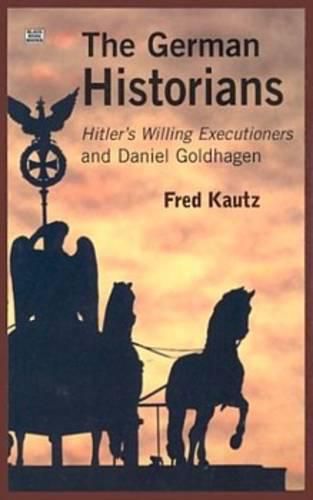Readings Newsletter
Become a Readings Member to make your shopping experience even easier.
Sign in or sign up for free!
You’re not far away from qualifying for FREE standard shipping within Australia
You’ve qualified for FREE standard shipping within Australia
The cart is loading…






In 1997, Daniel Goldhagen published his groundbreaking international best-seller, Hitler’s Willing Executioners, in an attempt to lay to rest many Holocaust myths: that Germans were ignorant of the mass destruction of the Jews; that the killers were all SS men; and that those who slaughtered Jews did so reluctantly. Drawing on a wealth of unused archival materials, including the testimony of the killers themselves, Goldhagen showed how ordinary Germans, nurtured in a society where Jews were seen as evil and dangerous, willingly followed their beliefs to their logical conclusion. An explosive work, exhaustively documented and researched, Hitler’s Willing Executioners offered irrefutable proof that should have forced a fundamental revision of Holocaust thinking. Instead, it was rejected angrily by German historians with accusations of a lack of scholarship. Shocked that such insightful research could be so easily dismissed, Kautz offers his investigative study into the reception of Goldhagen’s work. Starting with an overview of the book itself, THE GERMAN HISTORIANS subjects the public and private utterances alongside the written reviews of three prominent German historians - Hans Mommsen, Hans-Ulrich Wehler and Eberhard Jackel - to a close examination, drawing a shocking conclusion about how we record history.
$9.00 standard shipping within Australia
FREE standard shipping within Australia for orders over $100.00
Express & International shipping calculated at checkout
In 1997, Daniel Goldhagen published his groundbreaking international best-seller, Hitler’s Willing Executioners, in an attempt to lay to rest many Holocaust myths: that Germans were ignorant of the mass destruction of the Jews; that the killers were all SS men; and that those who slaughtered Jews did so reluctantly. Drawing on a wealth of unused archival materials, including the testimony of the killers themselves, Goldhagen showed how ordinary Germans, nurtured in a society where Jews were seen as evil and dangerous, willingly followed their beliefs to their logical conclusion. An explosive work, exhaustively documented and researched, Hitler’s Willing Executioners offered irrefutable proof that should have forced a fundamental revision of Holocaust thinking. Instead, it was rejected angrily by German historians with accusations of a lack of scholarship. Shocked that such insightful research could be so easily dismissed, Kautz offers his investigative study into the reception of Goldhagen’s work. Starting with an overview of the book itself, THE GERMAN HISTORIANS subjects the public and private utterances alongside the written reviews of three prominent German historians - Hans Mommsen, Hans-Ulrich Wehler and Eberhard Jackel - to a close examination, drawing a shocking conclusion about how we record history.